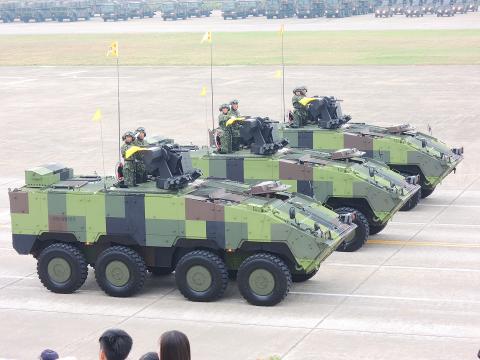With the last of the CM-32 Clouded Leopard armored vehicles equipped with 40mm automatic grenade launchers having rolled off the production line, the Ministry of National Defense has approved the manufacturing of variants mounted with 30mm chain guns, a military source said yesterday.
The ministry is ordering 284 of the chain-gun variant, while production of the 378 grenade launcher-equipped vehicles ordered by the ministry has been completed, a high-ranking official said on condition of anonymity.
There would be a slight discrepancy in the number of purchased units, due to the reassignment of 10 vehicles to the Military Police Command during military exercises last year, the ministry said, adding that replacements have been ordered.

Photo: Lo Tien-pin, Taipei Times
The CM-32 is to replace the army’s outdated and aging fleet of armored vehicles, the official said, adding that the order that was placed in 2006 is now expected to be finished in 2023, rather than 2021.
The total budget for the project after some adjustments is NT$58.9 billion (US$1.97 billion), the official said, adding that the CM-32 would improve the army’s offensive and defensive capabilities, as well as its mobility.
The command would next year be given priority for the chain-gun variant, the official said.
The decision came after the National Security Council’s assessment deemed the number of vehicles at the command to be unsatisfactory, the official said, adding that providing the command with both variants would give it more flexibility.
The command’s ability to safely evacuate the president, vice president and Cabinet members to an emergency command center in the event of a decapitation strike is critical, the official said.
The vehicles would also allow the command to provide a strong escort and to adequately defend key infrastructure and command centers, the official added.

ACTION PLAN: Taiwan would expand procurement from the US and encourage more companies to invest in the US to deepen bilateral cooperation, Lai said The government would not impose reciprocal tariffs in retaliation against US levies, President William Lai (賴清德) said yesterday, as he announced five strategies to address the issue, including pledging to increase Taiwanese companies’ investments in the US. Lai has in the past few days met with administrative and national security officials, as well as representatives from various industries, to explore countermeasures after US President Donald Trump on Wednesday last week announced a 32 percent duty on Taiwanese imports. In a video released yesterday evening, Lai said that Taiwan would not retaliate against the US with higher tariffs and Taiwanese companies’ commitments to

Intelligence agents have recorded 510,000 instances of “controversial information” being spread online by the Chinese Communist Party (CCP) so far this year, the National Security Bureau (NSB) said in a report yesterday, as it warned of artificial intelligence (AI) being employed to generate destabilizing misinformation. The bureau submitted a written report to the Legislative Yuan in preparation for National Security Bureau Director-General Tsai Ming-yen’s (蔡明彥) appearance before the Foreign Affairs and National Defense Committee today. The CCP has been using cognitive warfare to divide Taiwanese society by commenting on controversial issues such as Taiwan Semiconductor Manufacturing Co’s (TSMC, 台積電) investments in the

‘SPECIAL CHANNEL’: Taipei’s most important tasks are to stabilize industries affected by Trump’s trade tariffs and keep negotiations with Washington open, a source said National Security Council Secretary-General Joseph Wu (吳釗燮) arrived in the US for talks with US President Donald Trump’s administration, a source familiar with the matter said on Friday. Wu was leading a delegation for a meeting known as the “special channel,” the Financial Times reported earlier. It marked Trump’s first use of the channel since returning to the White House on Jan. 20. Citing a source familiar with the matter, the Financial Times reported that Minister of Foreign Affairs Lin Chia-lung (林佳龍) was also a part of the delegation. The visit came days after China concluded war games around Taiwan and amid Trump’s

HELPING HAND: The steering committee of the National Stabilization Fund is expected to hold a meeting to discuss how and when to utilize the fund to help buffer the sell-off The TAIEX plunged 2,065.87 points, or 9.7 percent, to close at 19,232.35 yesterday, the highest single-day percentage loss on record, as investors braced for US President Donald Trump’s tariffs after an extended holiday weekend. Amid the pessimistic atmosphere, 945 listed companies led by large-cap stocks — including Taiwan Semiconductor Manufacturing Co (TSMC, 台積電), Hon Hai Precision Industry Co (鴻海精密) and Largan Precision Co (大立光) — fell by the daily maximum of 10 percent at the close, Taiwan Stock Exchange data showed. The number of listed companies ending limit-down set a new record, the exchange said. The TAIEX plunged by daily maxiumu in just